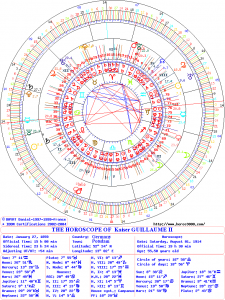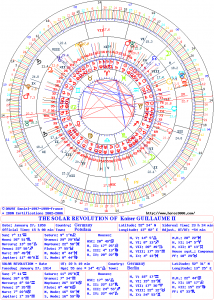- Austria-Hungary went to war and an irreversible process of alliances began:
- Austria-Hungary declared war against Serbia on July 28, 2014.
- The French government withdrew its troops ten kilometers inside its borders.
- On July 29, Russia declared partial mobilization against Austria-Hungary.
- On August 1, Germany declared war on Russia.
- The same day, France decreed general mobilization at 4pm.
- On August 2, Germany invaded Luxembourg.
- On August 3, Germany declared war on France and Belgium.
- The next day, the United Kingdom went to war against Germany as guarantor of Belgian neutrality.
The German defeat was fatal to the German monarchy. At the end of 1918, mutinies and the establishment of councils of soldiers or workers in major cities forced William II to abdicate on November 9, 1918 after the proclamation of the republic in a revolutionary climate. The armistice was ratified on November 11, 1918. It was a civilian, a deputy named Matthias Erzberger, a member of the Reichstag from 1903 to 1918, who was in charge of the German delegation and who approved the armistice for Germany. The Weimar Republic was established on 11 August 1919 in Weimar by the German National Constituent Assembly.
After his defeat, Wilhelm II was forced into exile in the Netherlands. He was considered as the main responsible for the First World War by the representatives of the Allied governments present at the signing of the Treaty of Versailles on June 28, 1919. This treaty established the League of Nations and endorsed sanctions against Germany and its allies. William II died on June 4, 1941, aged 82, in the Netherlands.
 |

|
- In Wilhelm II’s Horoscope:
On August 1, 1914 is set in 18° 56′ of Aries. This degree is of Powerful force in House XI.
The degree of the year is situated at 16° 58′ of Libra. It is of Middle force in House V. At fifty-five years and six months, it announces the Mercury-Moon period. The Moon is of Feeble force at the end of the House V.
First World War Germany – Analogies
- The degree of the day culminates in House XI and is of Powerful force. It is under the direct influence of its governor Mars, master of Aries which is also governor of the House XI. Mars is the god of war in ancient times. In this horoscope, Mars is of Very Powerful force at the Midheaven and an Evil quality in Pisces. It is also governor of 20° of Capricorn which receives the House VII (by its Exaltation and its mastery over the Term). It is in analogy with exacerbated military power (Mars, of bad quality, culminating at the Midheaven), causing war (Mars Governor of House VII) due to a military alliance (Mars governor of the House XI which receives also the degree of the day).
- The Moon, master of the period, is of Evil quality because in Fall in Scorpio. Although of Feeble force at the end of the House V, Moon is determinant of the war because directly connected to Mars:
- Mars is the ruler of the degree of the Moon in Scorpio, its sign of Domicile.
- The Moon (at 26° 51′) is into the exact degree of Mars (at 26° 49′).
-
In the Solar Revolution of 1914 (SR 1914):
On August 1, 1914 is positioned at 18° of Aries in natal House XI and House VII of SR.
The degree of year is at 14° 41′ of Libra in natal House V and conjunct with the Ascendant of SR.
The planetary period is Mercury-Mercury.The plus of Solar Revolution
- Valorization of Mars and the House VII, both determining factors of war:
- Natal Mars, of Evil quality and of Very Powerful force in Pisces at the natal Midheaven, is the governor of the degree of the day and of House VII of SR, located at 17° 36′ of Aries in conjunction with the degree of a day within one degree.
- Natal Mars is also governor of the natal House VII located at 20° 49′ of Capricorn.
- Mercury, master of the two periods, is conjunct at its natal position with the natal House VII. It is of Very Powerful force and a Middle quality. It is in analogy with a risk of war (House VII).
- The degree of the year is of Powerful force in conjunction with the Ascendant of SR. Located at 14° 41′ of Libra, it is also a degree awarded to Mercury (13° 28′), master of the two periods and conjunct with the natal House VII.
- First World War Germany – The abdication of Wilhelm II took place on November 9, 1918, at 59.78 years old. This date corresponds to 6° 11′ Scorpio in the circle of 80 years. It is a degree awarded to the Sun (7° 11′) which is of Powerful force and Middle quality in Scorpio. All degrees of the Sun are themselves under the influence of Saturn which is at 9° 01′.
At 59.78, this event occurred in the period Mercury-Saturn. Saturn is the governor of the degree of the Sun, of Evil quality in Aquarius. Saturn is of Very Evil quality in Leo, in one of its signs of Detriment. At its natal position, Saturn is opposite with the Sun and of Powerful force. These configurations announce the loss of prestige and disgrace (Sun in Aquarius of Evil quality) due to his defeat, the end of his reign and his dynasty (Saturn in Leo of Very Evil quality in House I, that of the quality of the relationship between Wilhelm II and the German nation).
Mercury, master of the Great Period, is governor of the House XII (0° 13′ Gemini), that of exile.
Tags: 1914, First World War, Germany, Wilhelm II
Both comments and pings are currently closed.
|